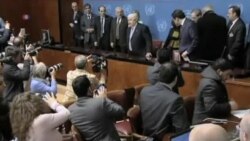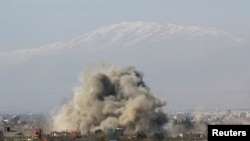LONDON —
U.N. mediator Lakhdar Brahimi wrapped up the first round of Syria peace talks in Geneva Friday reporting little progress on key issues of how to end the fighting and get much-needed humanitarian aid to besieged areas.
Brahimi told reporters the next round is set to begin on February 10, pending agreement from the Syrian government. Still, the government has not confirmed that it will attend.
Brahimi was frank during his press conference, saying "The gaps between the sides remain wide; there is no use pretending otherwise."
But he added he observed a "little bit of common ground."
Brahimi presented 10 points he believes the two sides agree on. But he acknowledged the list did not amount to much, mainly consisting of general statements about the need to negotiate a solution, ease the suffering of the Syrian people and build a country with respect for democracy and human rights.
"Progress is very slow indeed, but the sides have engaged in an acceptable manner," he said. "This is a very modest beginning, but it is a beginning on which we can build.”
The two sides could not reach agreement on humanitarian issues.
But Brahimi said that during eight days of “difficult” meetings, the government and opposition delegations got used to sitting in the same room, something it was initially not clear whether they would do at all.
“They have presented positions, and listened to one another," he said. "There have been moments when one side has even acknowledged the concerns and the difficulties and the point of view of the other side.”
Sides far apart
But there was little evidence of that in the two sides' news conferences Friday, as they accused each other of bringing terrorism to Syria and prolonging the suffering of its people.
Syrian Foreign Minister Walid Moualem said the opposition delegation is not representative and cannot control many of the armed groups. He said Syrian President Bashar al-Assad will decide whether the government delegation returns to Geneva.
“He will first read our reports about what's happened this week and accordingly he will discuss with us, the government also, and then the decision will be taken,” he said.
Moualem said if it returns, the government will discuss any aspect of the agenda, including the goal of establishing a transitional governing body. But he indicated that would not require Assad to step down.
The opposition disagrees. But spokesman Louay Safi was encouraged that the transition authority will at least be on the agenda if the talks resume.
“I'm sure this will be a very difficult process, but we will have to go through it," he said. "Saving Syria is really worth every second we spend here, even knowing that sometimes we are moving little, or moving nowhere.”
Indeed, no one expects the Syrian government to negotiate itself out of existence.
Middle East expert Hannah Poppy of the Risk Advisory Group said the February talks are not likely to achieve much more than the January talks did.
“This is very much a very early stage of any kind of negotiations, and what all sides have said will be a very long-term process," Poppy said. "I think potentially at the very least months, but more realistically years.”
And that is not good news for the Syrian people, who have been suffering through nearly three years of war, something the mediator urged both sides to keep in mind as they prepare for what he hopes will be another round of talks.
Images From Syria
Killings continue
The Syrian Observatory for Human Rights, a Britain-based monitoring group, said 1,870 people had been killed during this week's talks, including 450 civilians and 40 who died from inadequate access to food and medicine in areas besieged by government troops.
Brahimi said Thursday he was "very, very disappointed" the U.N. has not been able to deliver aid to the besieged rebel-held city of Homs, where many are said to be starving.
Meanwhile, the Obama administration urged Syria to speed up efforts to give up its chemical weapons for destruction. Speaking in Germany Friday, U.S. Secretary of State John Kerry said "there is no legitimate reason" for the delays in delivering and destroying the weapons.
Kerry called on President Assad and Syria to "live up to its obligations," or the U.S. will consider further steps, noting that "all options are on the table."
Syria's conflict began in March 2011 as peaceful protests against the government before spiraling into a civil war that the U.N. says has killed well over 100,000 people and forced nearly 9 million from their homes.
Some information for this report was provided by Reuters news agency.
Brahimi told reporters the next round is set to begin on February 10, pending agreement from the Syrian government. Still, the government has not confirmed that it will attend.
Brahimi was frank during his press conference, saying "The gaps between the sides remain wide; there is no use pretending otherwise."
Points of agreement between at Syria talks
Lakhdar Brahimi's points of agreement between Syria's warring parties:
-Discussing the implementation of the Geneva Communique
-Establishing at transitional governing body
-The urgent need to bring violence to an end
-The future of Syria must be determined by the Syrian people
-No loss of Syrian territory will be accepted
-The Syrian people want a genuinely democratic Syria
-The humanitarian situation musts be addressed rapidly
-Violent extremism and terrorism must be rejected
Brahimi presented 10 points he believes the two sides agree on. But he acknowledged the list did not amount to much, mainly consisting of general statements about the need to negotiate a solution, ease the suffering of the Syrian people and build a country with respect for democracy and human rights.
"Progress is very slow indeed, but the sides have engaged in an acceptable manner," he said. "This is a very modest beginning, but it is a beginning on which we can build.”
The two sides could not reach agreement on humanitarian issues.
But Brahimi said that during eight days of “difficult” meetings, the government and opposition delegations got used to sitting in the same room, something it was initially not clear whether they would do at all.
“They have presented positions, and listened to one another," he said. "There have been moments when one side has even acknowledged the concerns and the difficulties and the point of view of the other side.”
Sides far apart
But there was little evidence of that in the two sides' news conferences Friday, as they accused each other of bringing terrorism to Syria and prolonging the suffering of its people.
Syrian Foreign Minister Walid Moualem said the opposition delegation is not representative and cannot control many of the armed groups. He said Syrian President Bashar al-Assad will decide whether the government delegation returns to Geneva.
“He will first read our reports about what's happened this week and accordingly he will discuss with us, the government also, and then the decision will be taken,” he said.
Moualem said if it returns, the government will discuss any aspect of the agenda, including the goal of establishing a transitional governing body. But he indicated that would not require Assad to step down.
The opposition disagrees. But spokesman Louay Safi was encouraged that the transition authority will at least be on the agenda if the talks resume.
“I'm sure this will be a very difficult process, but we will have to go through it," he said. "Saving Syria is really worth every second we spend here, even knowing that sometimes we are moving little, or moving nowhere.”
Indeed, no one expects the Syrian government to negotiate itself out of existence.
Middle East expert Hannah Poppy of the Risk Advisory Group said the February talks are not likely to achieve much more than the January talks did.
“This is very much a very early stage of any kind of negotiations, and what all sides have said will be a very long-term process," Poppy said. "I think potentially at the very least months, but more realistically years.”
And that is not good news for the Syrian people, who have been suffering through nearly three years of war, something the mediator urged both sides to keep in mind as they prepare for what he hopes will be another round of talks.
Images From Syria
Killings continue
The Syrian Observatory for Human Rights, a Britain-based monitoring group, said 1,870 people had been killed during this week's talks, including 450 civilians and 40 who died from inadequate access to food and medicine in areas besieged by government troops.
Brahimi said Thursday he was "very, very disappointed" the U.N. has not been able to deliver aid to the besieged rebel-held city of Homs, where many are said to be starving.
Meanwhile, the Obama administration urged Syria to speed up efforts to give up its chemical weapons for destruction. Speaking in Germany Friday, U.S. Secretary of State John Kerry said "there is no legitimate reason" for the delays in delivering and destroying the weapons.
Kerry called on President Assad and Syria to "live up to its obligations," or the U.S. will consider further steps, noting that "all options are on the table."
Syria's conflict began in March 2011 as peaceful protests against the government before spiraling into a civil war that the U.N. says has killed well over 100,000 people and forced nearly 9 million from their homes.
Some information for this report was provided by Reuters news agency.






